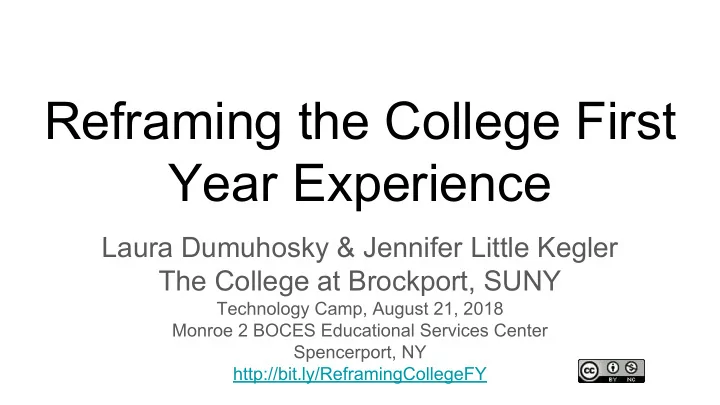

Reframing the College First Year Experience Laura Dumuhosky & Jennifer Little Kegler The College at Brockport, SUNY Technology Camp, August 21, 2018 Monroe 2 BOCES Educational Services Center Spencerport, NY http://bit.ly/ReframingCollegeFY
Higher Education Definitions Association of Academic and Research Libraries (ACRL) The ACRL Framework for Information Literacy for Higher Education (The Framework) “ Information literacy is the set of integrated abilities encompassing the reflective discovery of information, the understanding of how information is produced and valued, and the use of information in creating new knowledge and participating ethically in communities of learning (ACRL, 3).” Threshold Concepts: Authority is Constructed & Contextual Information Creation as Process Information has Value Research as Inquiry Scholarship as Conversation Searching as Strategic Exploration
SUNY and Local Definitions General Education Requirements and Assessment SUNY Student Learning Outcomes Information Management Competency perform the basic operations of personal computer use; understand and use basic research techniques; and locate, evaluate and synthesize information from a variety of sources GEP100 & ENG112 “Academic Planning Seminar” or FYE Course Introductory Composition Course
Library Anxiety and the Need for Collaboration Constance Melon (1986) coined phrase “library anxiety” and has been cited in related research over 600 times - Get them in the library & on the website - Help them feel more comfortable - Help them know it is good to ask questions https://www.slideshare.net/ShahiraKhair/library-anxiety-66609131
GEP100 New Model Three major benefits: 1) Peer mentors needed something on which to base their grades. 2) Allowed new first year students to ease into the library experience. 3) Peer mentors developed a better understanding of the library.
ENG112 Information Literacy - Take 1 Three session format: - 10 minutes in their classroom to outline search strategies and to introduce the concept of the TRAP Method (assign worksheet “Using Non-Scholarly Sources to Generate Search Terms”) - 10 minutes in their classroom to discuss the application of the TRAP Method (review first worksheet one and assign worksheet “Searching and Researching”) - 50 minutes in the library to search the databases and review the importance of citation Assessment materials for us, per student, per section: 1 brainstorm activity +3 source evaluations +1 works cited page ÷ 2 librarians Too much!
ENG112 Information Literacy - Take 2 Still a three session format - 15 minutes in their classroom focusing on friendly introductions and the importance of search terms (assign worksheet “Using Non-Scholarly Sources to Generate Search Terms”) - 50 minutes in the library to search the databases and review the TRAP method - 10 to 15 minutes in their classroom to discuss the importance of citation and answer any lingering questions (creating an online alternative) Assessment materials for us, per student, per section: 1 brainstorm activity +1 source evaluation +1 works cited (or preferably annotated bibliography) ÷ 2 librarians Success!
General Education Assessment Committee - Laura joined in January, 2017; Jennifer joined January, 2018 Criteria Exceeding Meeting Approaching Not Meeting Determine appropriate Effectively defines the Defines the scope of the Defines the scope of the Has difficulty defining the search terms to scope of the research research question or research question or scope of research represent a topic question or thesis. thesis completely. Can thesis incompletely question or thesis. Has Effectively determines determine key concepts. (parts are missing, difficulty determining key key concepts. Types of Types of information remains too broad or too concepts. Types of information (sources) (sources) selected relate narrow, etc.). Can information (sources) selected directly relate to to concepts or answer determine key concepts. selected do not relate to concepts or answer research question. Types of information concepts or answer research question. (sources selected research question. partially relate to concepts or answer research question. 7 criteria 4 categories
TRAP module T IMELINESS R ELEVANCE A UTHORITY P URPOSE When was this Does this discuss Who is the Is the source published? at least part my author? peer-reviewed? topic? Has it ever been Does this allow Does the source What is the updated? me to build on tell me about the purpose? the topic? author? Do I need Does this provide Is the author Is the purpose up-to-date a point I can qualified? stated clearly? information? disprove? Would an older Is my topic still Where did the Who is the source be better? important in the author get their intended field? information? audience?
Future iterations/hopes
Bibliography Association of College and Research Libraries. (2018). Framework for Information Literacy. http://www.ala.org/acrl/standards/ilframework College at Brockport. (2018). College composition course description page. https://www.brockport.edu/academics/english/composition/english_112.html Khair, S. (2016). Library anxiety infographic. Slideshare . Retrieved from https://www.slideshare.net/ShahiraKhair/library-anxiety-66609131 Mellon, C. (1986). Library anxiety: A grounded theory and its development. College and Research Libraries, 47 (2). Retrieved from https://crl.acrl.org/index.php/crl/article/view/14195/15641 State University of New York. (2018). General education requirements. https://www.suny.edu/attend/academics/genedreq/
Q & A http://bit.ly/ReframingCollegeFY jkegler@brockport.edu ldumuhos@brockport.edu
Recommend
More recommend